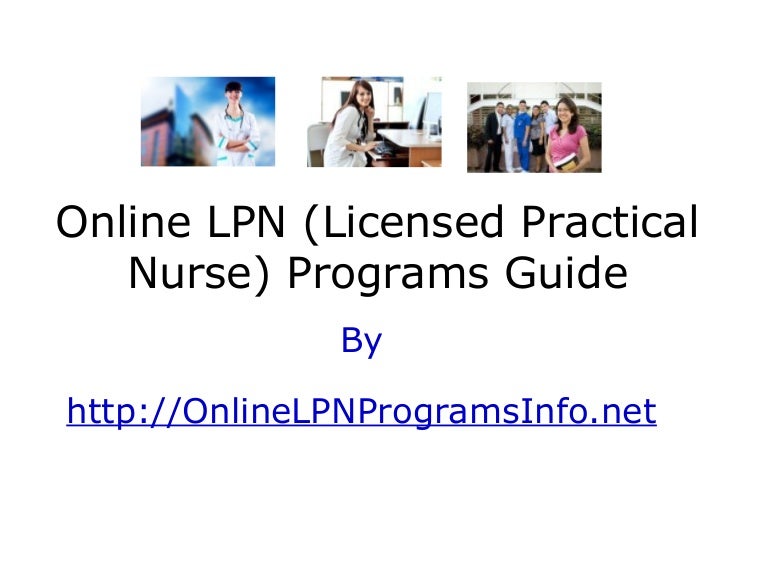lpn degree online opens the door to a dynamic and rewarding career in nursing, offering a unique blend of flexibility and comprehensive training. As the healthcare landscape evolves, the demand for licensed practical nurses continues to rise, with online programs providing an accessible route for aspiring nursing professionals. These courses often encompass essential topics such as patient care, pharmacology, and nursing ethics, ensuring that students are well-equipped to thrive in a variety of healthcare settings.
The structure of online LPN programs typically combines theoretical learning with practical experiences, allowing students to engage with course materials at their own pace. This format not only caters to different learning styles but also accommodates the diverse schedules of students balancing work or family commitments. With the right blend of motivation and dedication, pursuing an LPN degree online can be a transformative step towards a fulfilling career in healthcare.
Overview of LPN Degree Online

The online Licensed Practical Nurse (LPN) degree programme offers a flexible and accessible path to entering the nursing profession. With the increasing demand for healthcare services, pursuing an LPN qualification online has become an attractive option for many aspiring nurses. This approach allows students to balance their studies with work and personal commitments while receiving the education and training necessary to succeed in the field.
The structure of an online LPN programme is designed to provide comprehensive theoretical knowledge accompanied by practical experience. Courses are typically delivered through a combination of live lectures, recorded sessions, and interactive discussions. Students engage with instructors and peers through various online platforms, fostering a collaborative learning environment. Furthermore, many programmes incorporate on-site clinical training, ensuring that students gain essential hands-on experience in a controlled setting.
Benefits of Pursuing an LPN Degree Online
The advantages of enrolling in an online LPN programme are manifold, particularly when considering the demands of modern life. One of the primary benefits is the flexibility it offers. Students can tailor their study schedules around their existing commitments, making it easier to manage work and family responsibilities. Moreover, online learning can often lead to reduced commuting costs and time, allowing students to focus more on their education.
In addition to flexibility, online programmes frequently provide access to a wider array of resources than traditional classrooms. Students can benefit from digital libraries, simulation software, and varied multimedia learning tools. This enhanced accessibility can lead to a richer educational experience, enabling learners to engage with the content in diverse ways.
Typical Courses in an Online LPN Curriculum
An online LPN curriculum comprises a diverse range of courses designed to equip students with the necessary skills and knowledge for nursing practice. The following courses are commonly included in such programmes:
- Fundamentals of Nursing: This foundational course covers essential nursing skills, patient care principles, and the nursing process.
- Pharmacology: Students learn about medication administration, drug classifications, and the implications of pharmacological treatment.
- Medical-Surgical Nursing: This course focuses on nursing care for adult patients with a variety of medical conditions, including surgical and critical care situations.
- Maternal and Child Health Nursing: Emphasis is placed on care during pregnancy, childbirth, and the early stages of childhood.
- Geriatric Nursing: This course prepares students to deliver quality care to the elderly population, addressing unique health challenges and considerations.
- Psychiatric Nursing: Students explore mental health issues, therapeutic communication, and the role of nursing in supporting individuals with mental health disorders.
In summary, the online LPN programme combines theoretical knowledge with practical skills, making it an excellent option for those aspiring to enter the nursing profession. Students can enjoy the convenience and flexibility of online learning while still receiving a comprehensive education that prepares them for the challenges of nursing practice.
Admission Requirements for Online LPN Programs: Lpn Degree Online

Enrolling in an online Licensed Practical Nurse (LPN) programme requires meeting specific admission criteria that ensure prospective students are adequately prepared for the rigours of nursing education. These requirements vary by institution but generally encompass a set of common prerequisites that provide a foundation for success in the field.
The admission process for online LPN programmes often necessitates the submission of several key documents, which are vital for evaluating a candidate’s suitability for the course. Understanding these requirements can streamline your application process and enhance your chances of acceptance.
Common Prerequisites for Enrolment
Before embarking on your journey to become a Licensed Practical Nurse, it is essential to be aware of the typical prerequisites for admission. Candidates usually need to fulfil the following criteria:
- Completed high school education or GED equivalent.
- Minimum GPA requirement, often around 2.5 or higher.
- Completion of prerequisite courses, such as biology, chemistry, and mathematics.
- Minimum age requirement, typically 18 years old by the start of the programme.
- Basic computer literacy and internet access for online coursework.
Checklist of Documents for Application
In order to facilitate a smooth application process, prospective students should prepare a comprehensive set of documents. Below is a checklist of essential materials that applicants will commonly need to submit:
- Completed application form, often available on the institution’s website.
- Official high school transcripts or equivalent educational certificates.
- Transcripts from any post-secondary institutions attended.
- Standardised test scores, if applicable (e.g., TEAS, ACT).
- Letters of recommendation from educators or healthcare professionals.
- A personal statement or essay outlining motivation for pursuing a nursing career.
- Resume detailing relevant work or volunteer experience in healthcare settings.
Tips for Strengthening Your Application
Enhancing your application can significantly improve your chances of securing a spot in a competitive online LPN programme. Prospective students are encouraged to consider the following strategies:
- Engage in volunteer work or internships within healthcare settings to gain relevant experience.
- Attend nursing workshops or seminars to showcase commitment to the profession.
- Network with current nursing students or professionals to gain insights and guidance.
- Demonstrate strong communication skills in your personal statement and interviews.
- Ensure all documents are meticulously prepared and submitted before deadlines.
“A well-prepared application not only reflects your qualifications but also demonstrates your genuine passion for nursing.”
Advantages of LPN Degree Online
The advancement of technology has transformed the landscape of education, particularly in the realm of healthcare training. Pursuing an LPN (Licensed Practical Nurse) degree online offers a multitude of benefits that cater to the diverse needs of aspiring nurses. This format not only provides an accessible pathway to entry-level nursing roles but also enhances the overall learning experience.
Flexibility of Online LPN Programs
Online LPN programs offer unparalleled flexibility compared to traditional classroom settings. Students can engage with course materials at their convenience, allowing them to balance their studies with personal and professional commitments. This flexibility is particularly beneficial for those who may be working or have familial obligations. For instance, a single parent may find it easier to study during late evenings when the children are asleep, thus accommodating their unique schedule without sacrificing educational goals.
Potential Cost Savings of Online LPN Programs
The financial implications of pursuing an LPN degree online can be significantly advantageous. Enrolling in an online program often reduces costs associated with commuting, housing, and other on-campus expenses. Furthermore, many online programs offer competitive tuition rates, making it a more economical choice. For example, students may save on fuel or public transport costs, and they are often not required to purchase expensive textbooks, as many resources are available digitally.
“Investing in an online LPN degree can lead to substantial financial savings, making education more accessible.”
Catering to Different Learning Styles and Schedules
Online LPN programs are designed to accommodate various learning styles, enhancing student engagement and retention. The digital format allows for a mixture of multimedia resources, such as videos, interactive simulations, and discussion forums, which can appeal to visual, auditory, and kinesthetic learners alike. Moreover, students can revisit lectures and materials at their own pace, reinforcing their understanding.
This adaptability in learning environments is further exemplified through the varied assessment methods employed in online courses. Students may encounter quizzes, written assignments, and practical assessments that can be tailored to fit their learning preferences, ultimately enabling them to thrive in their educational journey.
Additionally, the scheduling of online programs often aligns with the availability of students, allowing for a personalised educational experience that fits individual lifestyles. This is particularly advantageous for those whose work or family commitments may not align with traditional class times, thus providing a more inclusive approach to education in nursing.
Career Opportunities with an LPN Degree

The attainment of a Licensed Practical Nurse (LPN) degree opens a myriad of career pathways within the healthcare sector. As a vital component of the nursing team, LPNs possess diverse skills that enable them to provide essential care in various settings. This section delves into the professional environments LPNs may enter, opportunities for career advancement, and a snapshot of the job market and salary expectations for new graduates.
Healthcare Settings for LPN Employment
LPNs can find employment in a variety of healthcare environments, each offering unique experiences and responsibilities. The following illustrates prominent settings where LPNs are commonly employed:
- Hospitals: LPNs assist in patient care, monitoring vital signs, and administering medications under the supervision of registered nurses and physicians.
- Nursing Homes: In long-term care facilities, LPNs play a crucial role in providing daily care to elderly residents, managing their medications, and supporting their overall health.
- Home Healthcare: LPNs deliver personalised care to patients in their homes, which may include wound care, medication management, and daily living assistance.
- Clinics: In outpatient settings, LPNs support medical staff in various capacities, including patient intake, basic assessments, and administrative tasks.
- Rehabilitation Centres: These professionals assist in the recovery of patients undergoing rehabilitation therapies, helping them regain daily function and mobility.
- Schools: LPNs may also work in educational institutions, providing health assessments and care to students, as well as managing health crises.
Pathways for Career Advancement
Upon gaining experience, LPNs have multiple avenues for professional growth. Career advancement can be achieved through additional education and certification, leading to enhanced roles and responsibilities. The following pathways illustrate potential developments in an LPN’s career:
- Registered Nurse (RN) Transition: Many LPNs opt to continue their education and become RNs through bridge programs, greatly expanding their scope of practice and earning potential.
- Specialisation: LPNs may pursue certifications in specialised areas such as gerontology, paediatrics, or intravenous therapy, increasing their expertise and job prospects.
- Administrative Roles: With additional training, LPNs can transition into management and supervisory positions within healthcare facilities, overseeing nursing staff and care delivery.
- Teaching Roles: Experienced LPNs can take up teaching positions in vocational schools, sharing their knowledge and skills with the next generation of nursing professionals.
Job Demand and Salary Expectations
The demand for qualified LPNs remains robust, driven by the continuous need for healthcare services across the ageing population and various healthcare settings. According to the U.S. Bureau of Labor Statistics, employment for LPNs is projected to grow by 9% from 2020 to 2030, faster than the average for all occupations.
Salary expectations for LPN graduates can vary based on location, experience, and work setting. The median annual wage for LPNs in the UK is approximately £27,000, with potential earnings ranging from £22,000 to £35,000 annually, depending on the aforementioned factors.
“The versatility of an LPN role allows for significant opportunities in various healthcare fields and the potential for lucrative career paths.”